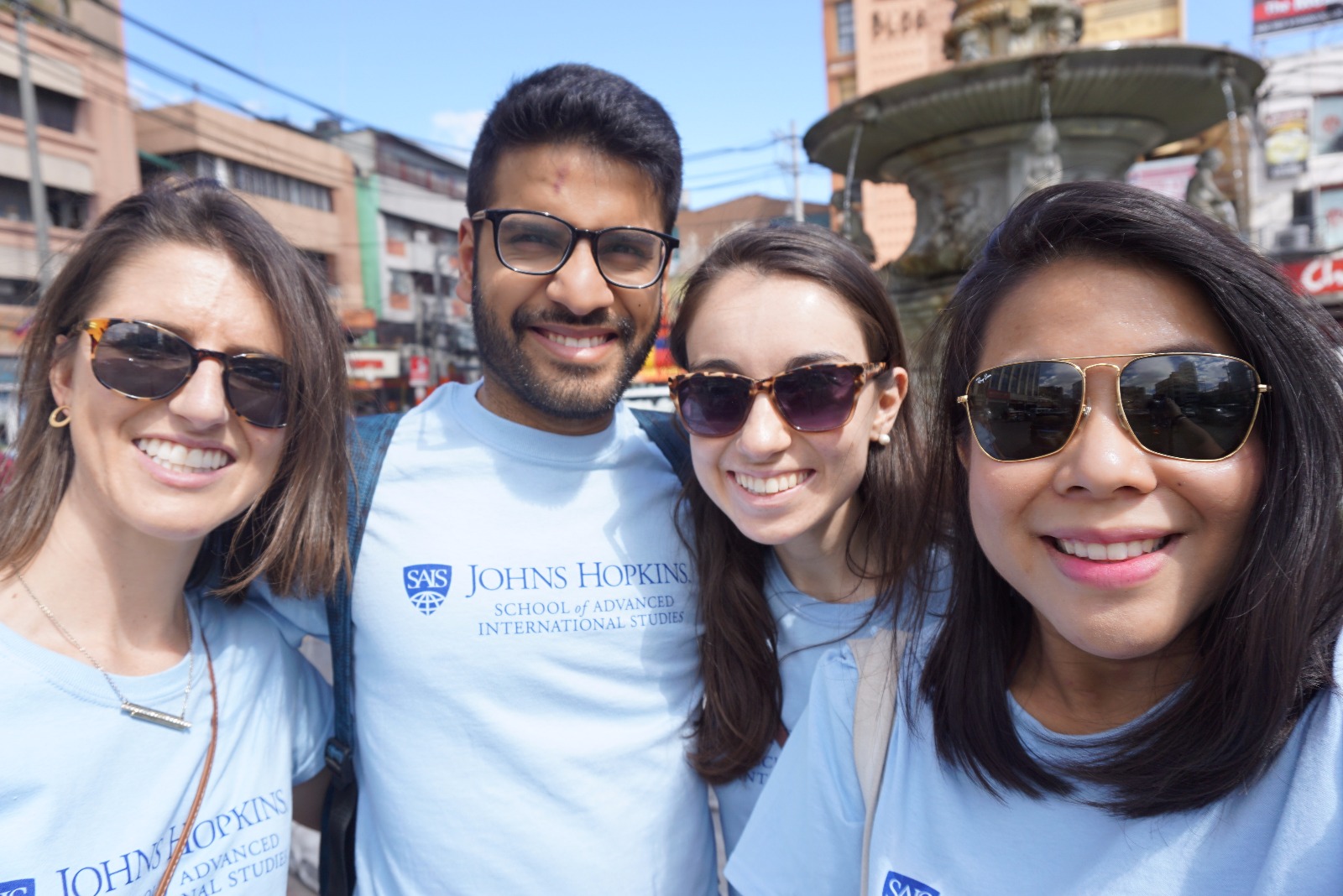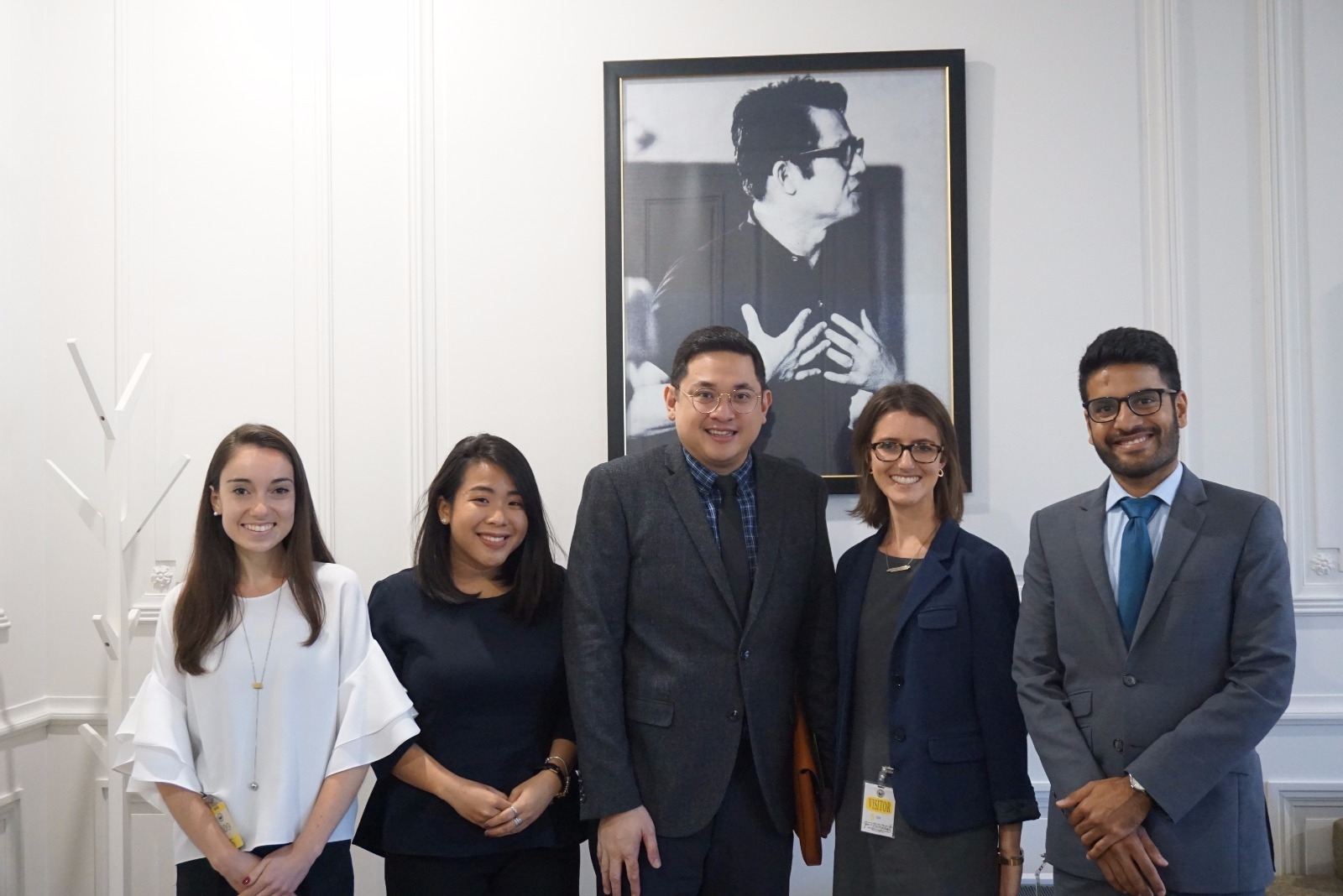BY AMMAR KHALID, HELENA MOLINA, SUSANNAH HORTON and PATTEERA MAE CHALADMANAKUL
Ammar Khalid, Helena Molina, Susannah Horton, and Patteera Mae Chaladmanakul are second-year International Development students who recently traveled to the Philippines, to gain a deeper knowledge of possible financing models for youth entrepreneurs. Throughout the year, the team conducted a global stocktaking on successful models for financing young entrepreneurs. The forthcoming report will be published jointly by the IFC's SME Finance Forum and the G20 Global Partnership for Financial Inclusion.
The IDEV Practicum allows students to work directly with public, private and non-governmental organizations as a capstone to their graduate studies. The IDEV Practicum Blog is a six-part series that chronicles the travels of IDEV students who take on client projects over winter break.
On a cloudy day in Manila back in January, we met Alex, co-founder of Akaba, a Filipino social enterprise that sells high-quality travel bags featuring handwoven textiles sourced from traditional weaving communities across the Philippines. Akaba was founded four years ago. In the context of our practicum project – a global stocktaking on models for financing youth entrepreneurs – we were interested to learn how he and his two equally youthful co-founders financed their enterprise.
Our connection with Alex (one of the case studies for our practicum project) began with BPI Sinag – an accelerator and business competition run by the Bank of the Philippine Islands (BPI). In 2016, Akaba won a grant at the end of the second round of BPI Sinag. However, despite winning and subsequently experiencing substantial growth, his enterprise failed to qualify for a loan, even with BPI. Eager to expand his business, Alex explained that he had exhausted all his local financing options and asked us for any financing leads. His predicament is telling of the broader financing landscape for young entrepreneurs, not just in the Philippines, but globally.
A crisis in youth unemployment is brewing. Young people, when compared with the non-youth population, are up to three times as likely to be unemployed. For entrepreneurship to hold any promise of mitigating this crisis, young entrepreneurs need to overcome barriers to starting and scaling businesses. Chief among these barriers is lack of access to finance.
Our Practicum team was tasked by the IFC’s SME Finance Forum to conduct a global stocktaking of successful models for financing young entrepreneurs to inform improved design of future youth financing programs and policies. During the Fall semester, our team conducted phone interviews to develop 35 case studies from around the world. These case studies were then used as a basis to analyze trends and formulate policy recommendations with regards to youth financing schemes.
The case studies show that young entrepreneurs can, in fact, be catered to in a financially and socially sustainable manner despite their lack of credit histories and the physical assets necessary for collateral. The key lies with providing not just financing for young entrepreneurs – though alternative credit scoring and milestone-based financing are innovative ways of reaching young clients – but also integrating this with non-financial services such as mentorship. The incorporation of financial technology (FinTech) has also resulted in reduced administrative costs and thus made servicing young clients feasible.
To complement our findings from the case studies, our team visited the Philippines during the winter break with the goal of mapping the broader entrepreneurship ecosystem in the country. We met with individuals from various sectors including the government, academia, commercial banks, FinTech startups, as well as young entrepreneurs. Themes that emerged during our interviews resonated greatly with those in the case studies. Youth are not encouraged to risk pursuing entrepreneurship… youth cannot access capital without collateral… youth lack the technical and financial support to successfully scale a business…
Senator Bam Aquino, a former social entrepreneur and now leading political figure who has been instrumental in drafting policies promoting youth entrepreneurship in the Philippines, told us that he envisions a central role for the government in promoting young entrepreneurs. He talked of an ‘adventure fund’ for young entrepreneurs, reasoning that ‘some amount of free money is needed’ initially, before the private sector takes the reins.
During our conversation with Rico Gonzalez, who founded xChange, an incubator for early-stage social enterprises, and Joan Yao, Vice President of KickStart, the country’s leading venture capital firm, a similar chord was struck. Since the Philippine economy features great income inequality and is dominated by a small set of elites – according to Rico, “every problem can be solved with three phone calls, but you need to know who to call and who should make the call” – the Philippines does not have enough players in the ecosystem to diversify funding sources. Remember, only four years in, Alex of Akaba felt he had already exhausted Philippines-based funding sources. In this case, incremental youth-centric efforts by the private sector, encouraged by the government, may be what the country needs most to break away from their undesirable status quo.
As our team finalizes the global stocktaking report, we hope that lessons learned and recommendations based on our extensive collection of case studies will allow governments, as well as relevant key stakeholders, to be informed and to implement different ways to improving youth financing. With more youth-focused financing programs in place, young entrepreneurs, like Alex, will have improved access to financing and higher probabilities of starting and sustaining their own businesses.
To read about what work the other IDEV Practicum teams did this year, visit this page.



COVER PHOTO CREDIT: Glendale Lapastora (1) from Flickr licensed under CC BY S.A-2.0

